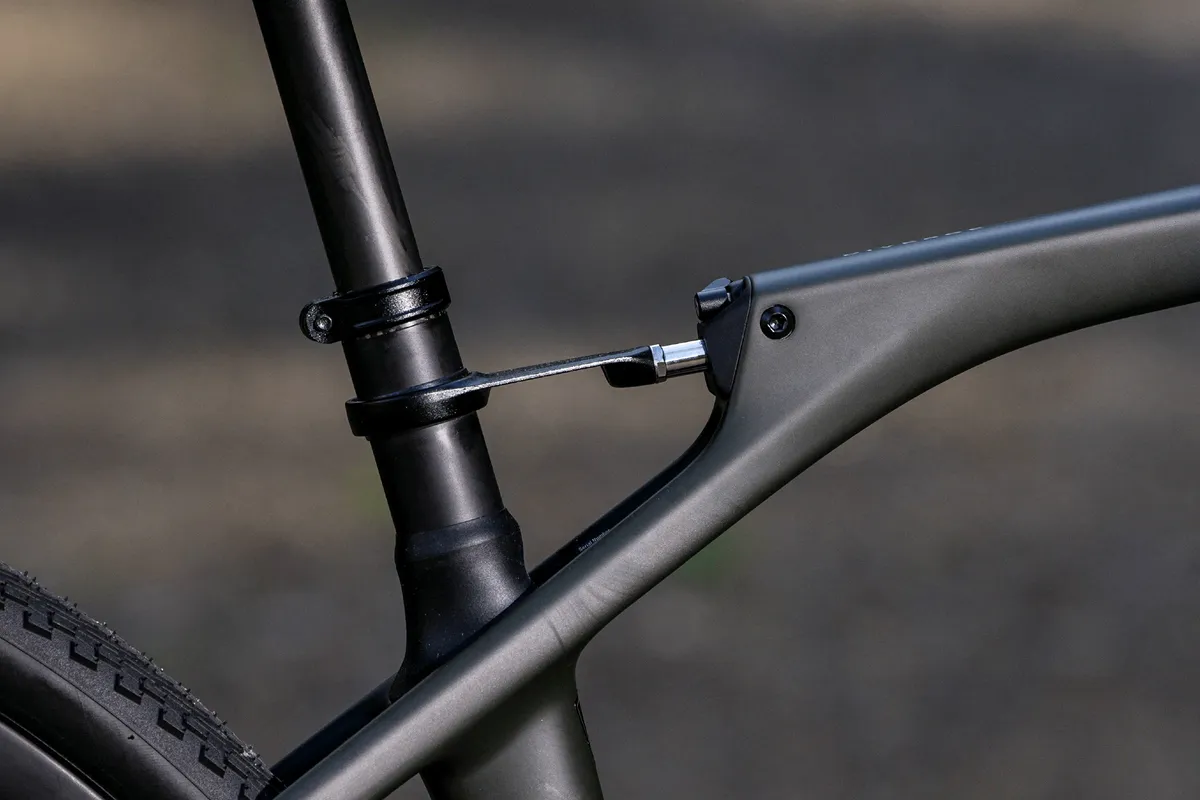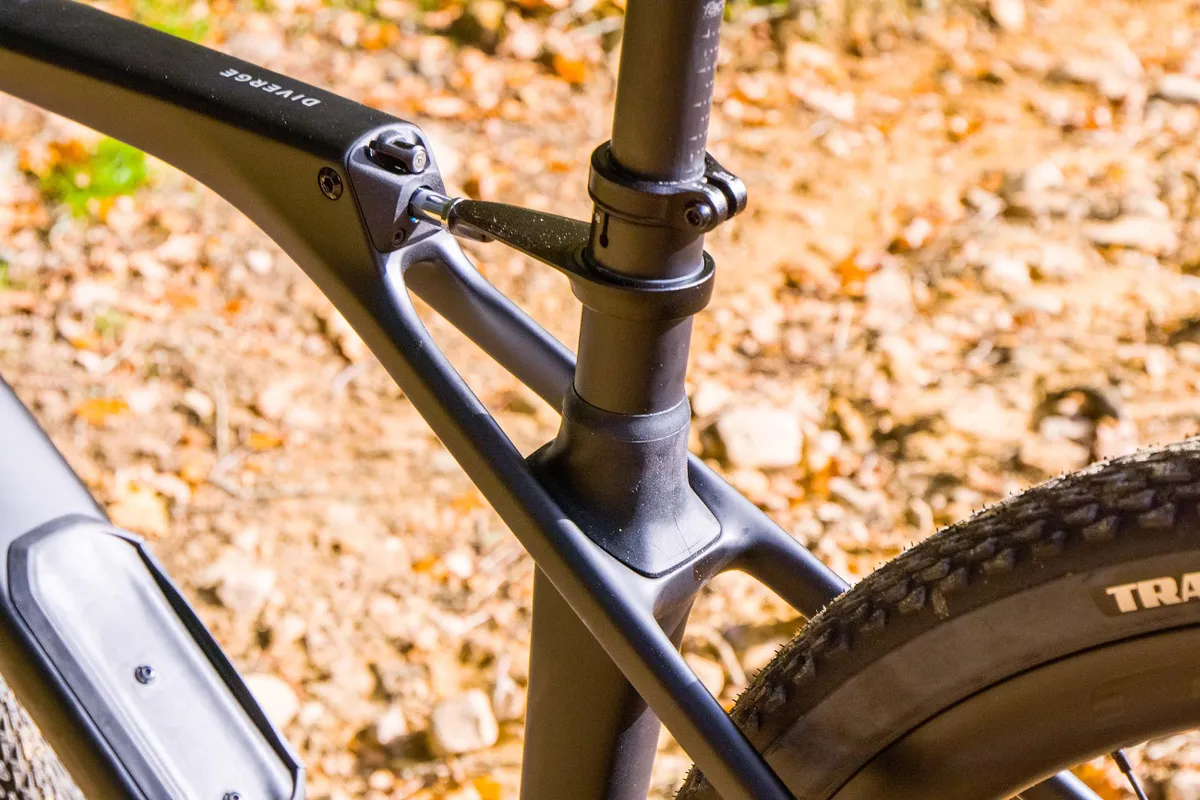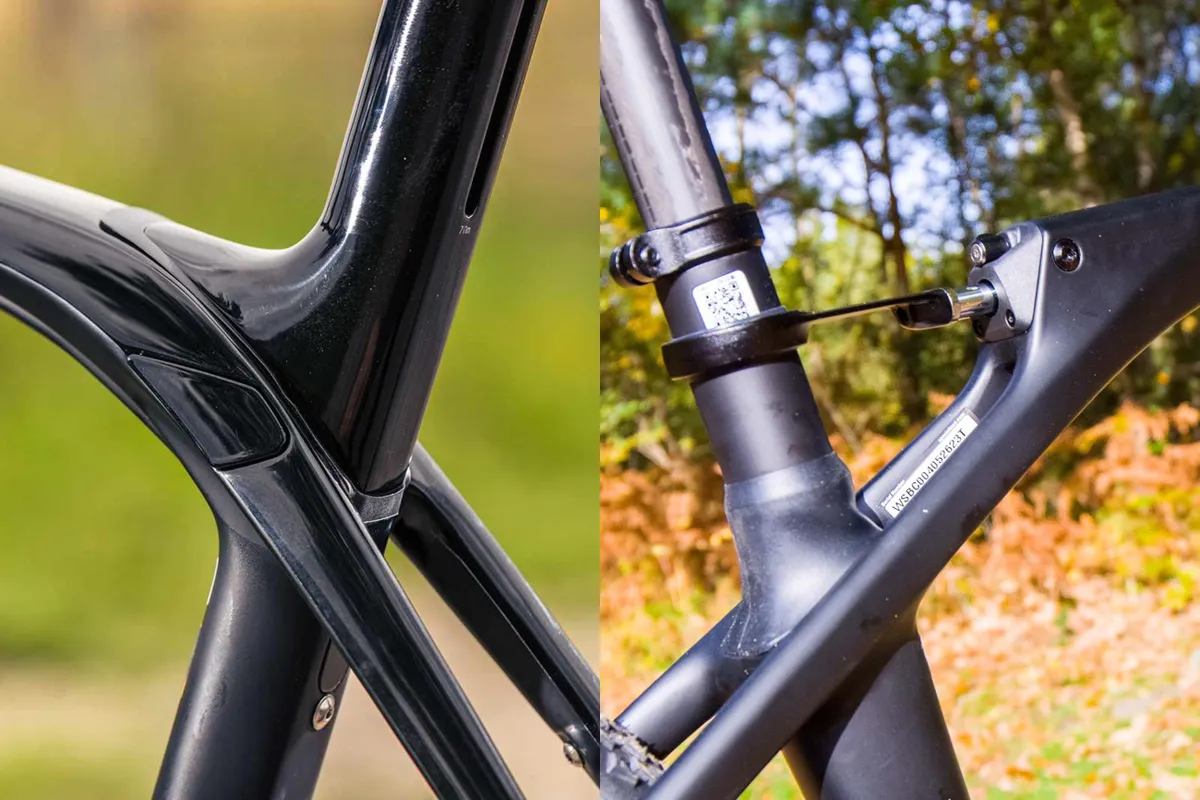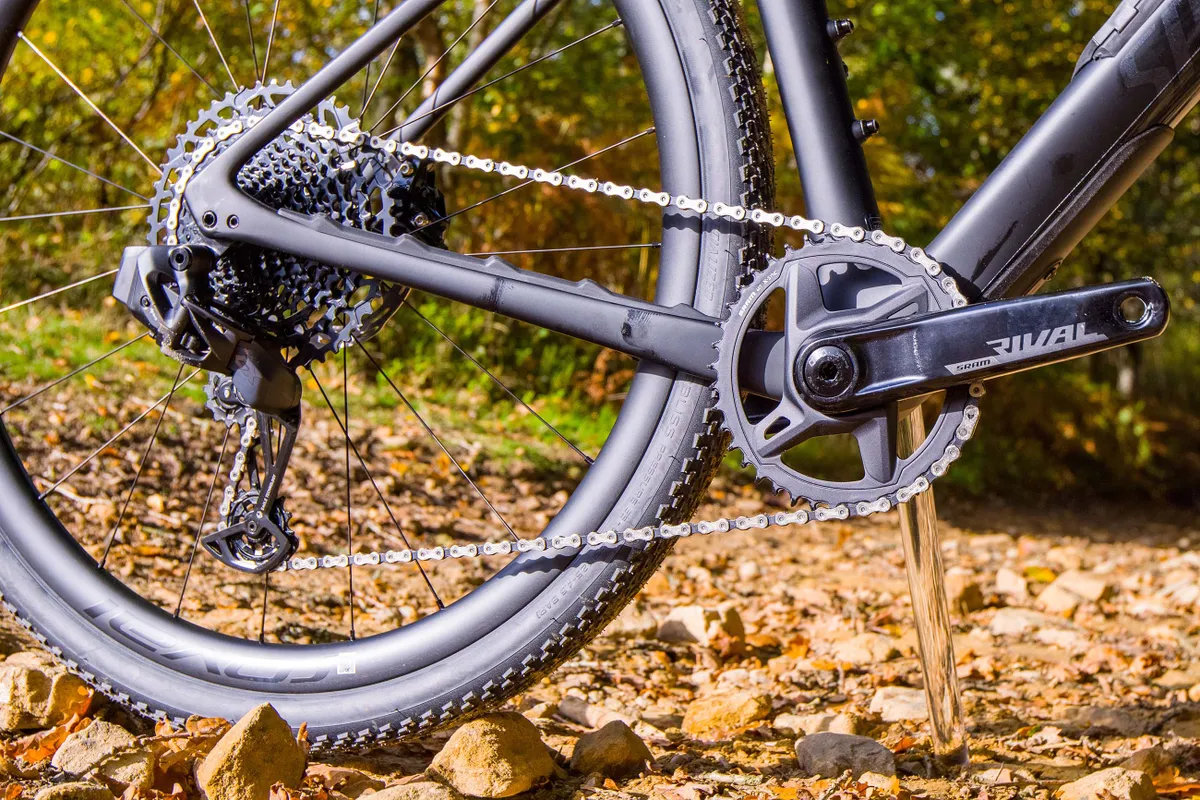Specialized has launched the Diverge STR, an updated version of its versatile gravel bike featuring a new Future Shock Rear design, consisting of a flexible frame post, damper and tendon.
The Future Shock Rear design has a frame post that's held in place low down the seat tube. When riding, the frame post will flex back and forward, providing up to 30mm of travel, helping to increase efficiency and reduce fatigue.
The aluminium tendon connects the frame post to the damper in the top tube, which controls the compression and rebound, preventing the flexing post from throwing you out of the saddle.
The gravel suspension system is said to be tailored to counteract the small bumps and impacts one can expect while gravel riding, enabling you to remain seated over bumps to retain traction and power.
The Diverge STR has much in common with the 2021 Diverge, sharing the same Future Shock 2.0 system in the head tube, 47mm tyre clearance (with 700c wheels) and the down tube SWAT storage compartment.
But thanks to the new Future Shock Rear and an adjusted geometry, Specialized says the Diverge STR is the most capable gravel bike it has ever made.
Specialized claims the Diverge STR reduces vibrations at the saddle by 20 per cent, compared to the previous Diverge.
It also happens to be the brand’s most expensive gravel bike, costing £13,000 / $14,000 / €15,000 in its S-Works guise. That’s £1,700 / $1,000 more than the 2022 Specialized S-Works Crux.
Alongside the S-Works Diverge STR, Specialized has also announced the Diverge STR Pro and Diverge STR Expert, costing £9,000 / $9,500 / €9,500 and £7,500 / $7,500 / €7,500, respectively.
New Future Shock Rear ‘suspends’ the rider

Specialized says the starting point for developing the Future Shock Rear was a problem that proved “simple, yet diabolically hard to solve”.
The brand wanted to find a way to keep riders comfortable and in control over rough terrain but retain the acceleration and direct handling of a rigid, double-diamond frame.
The process of finding a solution began more than five years ago with Chris D’Aluisio, one of Specialized's concept engineers, developing several Diverge prototypes more than two years before Specialized continued to refine the design for another three years.

Specialized says the final Diverge STR and Future Shock Rear design resolves the 'diabolical problem' by ‘suspending’ the rider above the rigid frame via the flexing frame post.
According to D’Aluisio, one of the advantages of this system is the travel happens in an arc shape, with your weight travelling down and backwards, rather than up and down on the seatpost axis.
D’Aluisio says riders are particularly sensitive to saddle height change and if the travel happened on the seatpost axis, it would feel as if it was “being pulled out from under you”.
By moving in an arc shape, the Future Shock Rear design ensures you can remain in the saddle over bumps.
D’Aluisio says this leads to a better ride experience, particularly when climbing. Instead of having to stand out of the saddle and ‘unweight’ the bike when riding over bumps, the Future Shock Rear means you can remain planted, gaining more traction and power as a result.
Stewart Thompson, Specialized’s road and gravel category leader, says the damper in the Diverge STR’s top tube controls the travel of the frame post flex, with compression and rebound damping.
“That damper is controlling the movement of your spring [frame] post system, so you don’t get bucked around back and forth and you can manage the compliance,” says Thompson.

Like the Future Shock 2.0 in the head tube, the Future Shock Rear can be adjusted while riding via a dial.
The Future Shock Rear weighs roughly 400g, according to Thompson. He says this is advantageous over the weight difference of between 1kg and 1.5kg you can see between hardtail mountain bikes and their full-suspension equivalents.
Pivot-free

BikeRadar first speculated the Diverge could see a frame-post based suspension system last year when a patent filed by Specialized revealed a hidden rear shock was in the works.
The patent included a pivot, but the system on the Diverge STR is pivot-free. The aluminium tendon, linking the frame post and damper, acts in place of a pivot, flexing as the system moves through its travel.
Suspension systems with pivots have 'stiction', which is friction that can prevent stationary surfaces from being set in motion.
Thompson says this isn't so much of an issue on mountain bikes, but a system with stiction wasn’t suitable for the Diverge.
“On a mountain bike with a big or high-volume tyre, small imperfections in the road and terrain are taken up by the tyre. Then, when you get a lot of force in the system, you break free of the stiction in the system and get into the travel of the shock,” he explains.
“With our system, we wanted it to be very active and supple and get away from the spring requiring a lot of force to engage.”
Nine frame posts

Specialized has developed nine frame posts with varying flex to ensure riders of different sizes and weights have the same experience using the Future Shock Rear.
Thompson says seven of these seatposts are tailored for the 52cm to 61cm frame, while the other two are specific to the 49cm frame.
Each post has two positions and you can rotate them by 90 degrees for different levels of stiffness based on the layup. This means there are 18 unique stiffnesses for riders between 46kg (100lb) and 125kg (275lb), according to Thompson.
Every bike will ship with two frame posts of different stiffnesses and Thompson says one of the two posts will likely be suitable for the rider, depending on weight.

Choosing the right frame post for you may appear to be a tricky affair. However, Thompson says the process of finding the right travel in the system isn’t too different from setting up mountain bike suspension.
“For the first ride or two around the block [on a mountain bike], you bring a shock pump to tune the setup, and you might do the same thing with a frame post setting,” says Thompson.
He adds that using your weight is a good starting point for deciding on the right frame post and stiffness. Beyond that, it comes down to feel.
“If you’re unhappy, it’s probably too soft. If you’re wondering whether it’s working, it’s probably too hard,” says Thompson.
How does Future Shock Rear compare to IsoSpeed?

Thompson says there is probably a similar philosophy in terms of the direction of compliance between the Future Shock Rear and Trek’s IsoSpeed design found on bikes such as the Domane and Madone before it was updated in 2022.
Thompson says, however, that the Future Shock Rear differs in two main ways: tunability and damping.
“With the rear Future Shock system, the number one thing is it's tunable and personalisable so every rider can get the same experience," he explains.
“With IsoSpeed, for the most part, there’s one setting and that’s the experience and amount of compliance you get.
“Second, the rear Future Shock has damping in it. So that controls and manages the increased amount of suspension you can get from the system."
‘Absurd capability’

The Diverge STR retains Specialized’s SWAT storage, which turns the space in the down tube into an area for storing a pump and spares.
All bikes in the current Diverge STR range come fitted with solid seatposts, but Specialized says the bikes can be fitted with dropper posts, and this won’t interfere with the Future Shock Rear suspension.
Specialized says the Diverge STR is compatible with front lowrider racks, fork-mounted cages and mudguards. You can also fit frame bags, but the brand says you should avoid mounting any bags that may interfere with the Future Shock Rear.
You may find your ideal frame-post stiffness to be different when using heavy bags, according to the Specialized.
1x drivetrain, only

Previous generations of the Diverge could be run with 2x drivetrains, but the Diverge STR is compatible with 1x drivetrains only.
Specialized’s representatives at the Diverge STR launch said the brand is now backing 1x drivetrains on gravel bikes, citing how single-chainring systems have become commonplace and proved successful in the world of mountain bikes.
Lower, longer, steeper

Specialized says the stack and reach of the Diverge STR are the same as other Diverge models and sizing is consistent between them.
However, the Diverge STR does see subtle changes to the geometry. The bottom bracket drop has increased by 5mm and the chainstay length is now 429mm rather than 425mm.
The seat tube angle is -0.5 degrees steeper. Specialized says this is to compensate for the sag in the Future Shock Rear system in the static position and your sagged riding position should be the same on the STR as other Diverge models.
Specialized Diverge STR geometry
| Size | 49cm | 52cm | 54cm | 56cm | 58cm | 61cm |
|---|---|---|---|---|---|---|
| Seat tube angle (degrees) | 74.5 | 74.25 | 74 | 74 | 74 | 74 |
| Head tube angle (degrees) | 70 | 70.5 | 71.25 | 71.75 | 71.75 | 71.75 |
| Chainstay (mm) | 429 | 429 | 429 | 429 | 429 | 429 |
| Bottom bracket drop (mm) | 80 | 85 | 85 | 85 | 85 | 85 |
| Seat tube (mm) | 390 | 430 | 470 | 500 | 530 | 560 |
| Top tube (mm) | 527 | 540 | 556 | 570 | 586 | 602 |
| Head tube (mm) | 100 | 100 | 115 | 130 | 155 | 182 |
| Wheelbase (mm) | 1,023 | 1,027 | 1,034 | 1,044 | 1,060 | 1,078 |
| Stack (mm) | 569 | 576 | 593 | 609 | 633 | 659 |
| Reach (mm) | 365 | 374 | 383 | 392 | 401 | 410 |
2023 Specialized Diverge STR price and specs
The top-spec Specialized S-Works Diverge STR will cost you £13,000 / $14,000 / €15,000. For this, you get a groupset made up of SRAM Red 1 AXS and XX1 Eagle components, along with a carbon handlebar and the brand’s Roval Terra CLX wheelset.
The Diverge STR Pro has a SRAM Force drivetrain and Roval Terra CL wheels, while the Diverge STR Expert has a SRAM Rival drivetrain and Roval Terra C wheels.
The wheelsets used across the range all have the same internal rim width of 25mm and all bikes have Specialized Tracer Pro 2BR 700x42mm tyres.
Specialized says an S-Works Diverge STR frameset is only available in the USA for the time being.
Specialized S-Works Diverge STR

- Frameset: S-Works Diverge FACT 11r carbon with front and rear Future Shock
- Handlebar: Roval Terra, carbon
- Stem: S-Works Future Stem with integrated computer mount
- Handlebar tape: Supacaz Super Sticky Kush
- Saddle: Body Geometry S-Works Power
- Seatpost: S-Works Carbon seatpost, 20mm offset
- Seatpost clamp: Specialized Alloy, 33.3mm
- Shift levers: SRAM Red eTap AXS
- Brakes: SRAM Red eTap AXS, hydraulic, 160mm rotor
- Rear derailleur: SRAM XX1 Eagle AXS
- Crankset: SRAM Red 1 AXS, 1x, 40t chainring
- Cassette: SRAM XG-1295 Eagle, 12-speed, 10-50t
- Chain: SRAM XX1 Eagle, 12-speed
- Bottom bracket: SRAM DUB BSA 68
- Wheelset: Roval Terra CLX, 25mm internal width, 32mm deep
- Tyres: Specialized Tracer Pro 2BR, 42x700mm
- Claimed weight: 8.5kg (size 56cm)
- Price: £13,000 / $14,000 / €15,000
Specialized Diverge STR Pro

- Frameset: Diverge FACT 11r carbon with front and rear Future Shock
- Handlebar: Roval Terra, carbon
- Stem: Future Stem, Pro
- Handlebar tape: Supacaz Super Sticky Kush
- Saddle: Body Geometry Power Pro
- Seatpost: S-works Carbon Seat Post, 20mm offset
- Seatpost clamp: Specialized Alloy, 33.3mm
- Shift levers: SRAM Force eTap AXS
- Brakes: SRAM Force, hydraulic, 160mm rotor
- Rear derailleur: SRAM X01 Eagle AXS
- Crankset: SRAM Force, 1x, 40t chainring
- Cassette: SRAM XG-1275 Eagle, 12-speed, 10-50t
- Chain: SRAM X01 Eagle, 12-speed
- Bottom bracket: SRAM DUB BSA 68
- Wheelset: Roval Terra CL, 25mm internal width, 32mm deep
- Tyres: Specialized Tracer Pro 2BR, 42x700mm
- Claimed weight: 8.9kg (56cm)
- Price: £9,000 / $9,500 / €9,500
Specialized Diverge STR Expert

- Frameset: Diverge FACT 11r carbon with front and rear Future Shock
- Handlebar: Specialized Adventure Gear Hover
- Stem: Future Stem, Comp
- Handlebar tape: Supacaz Super Sticky Kush
- Saddle: Body Geometry Power Expert
- Seatpost: S-Works Carbon Seat Post, 20mm offset
- Seatpost clamp: Specialized Alloy, 33.3mm
- Shift levers: SRAM Rival eTap AXS
- Brakes: SRAM Rival eTap AXS, hydraulic discs
- Rear derailleur: SRAM GX Eagle AXS
- Crankset: SRAM Rival eTAP AXS, 1x, 40t chainring
- Cassette: SRAM NX Eagle PG-12330, 12-speed, 11-50t
- Chain: SRAM GX Eagle, 12-speed
- Wheelset: Roval Terra C, 25mm inner width, 32mm deep
- Tyres: Specialized Tracer Pro 2BR, 42x700mm
- Claimed weight: 9.5kg (56cm)
- Price: £7,500 / $7,500 / €7,500
Specialized S-Works Diverge STR frameset
- Frameset: S-Works Diverge FACT 11r carbon with front and rear Future Shock
- Price: $6,000
